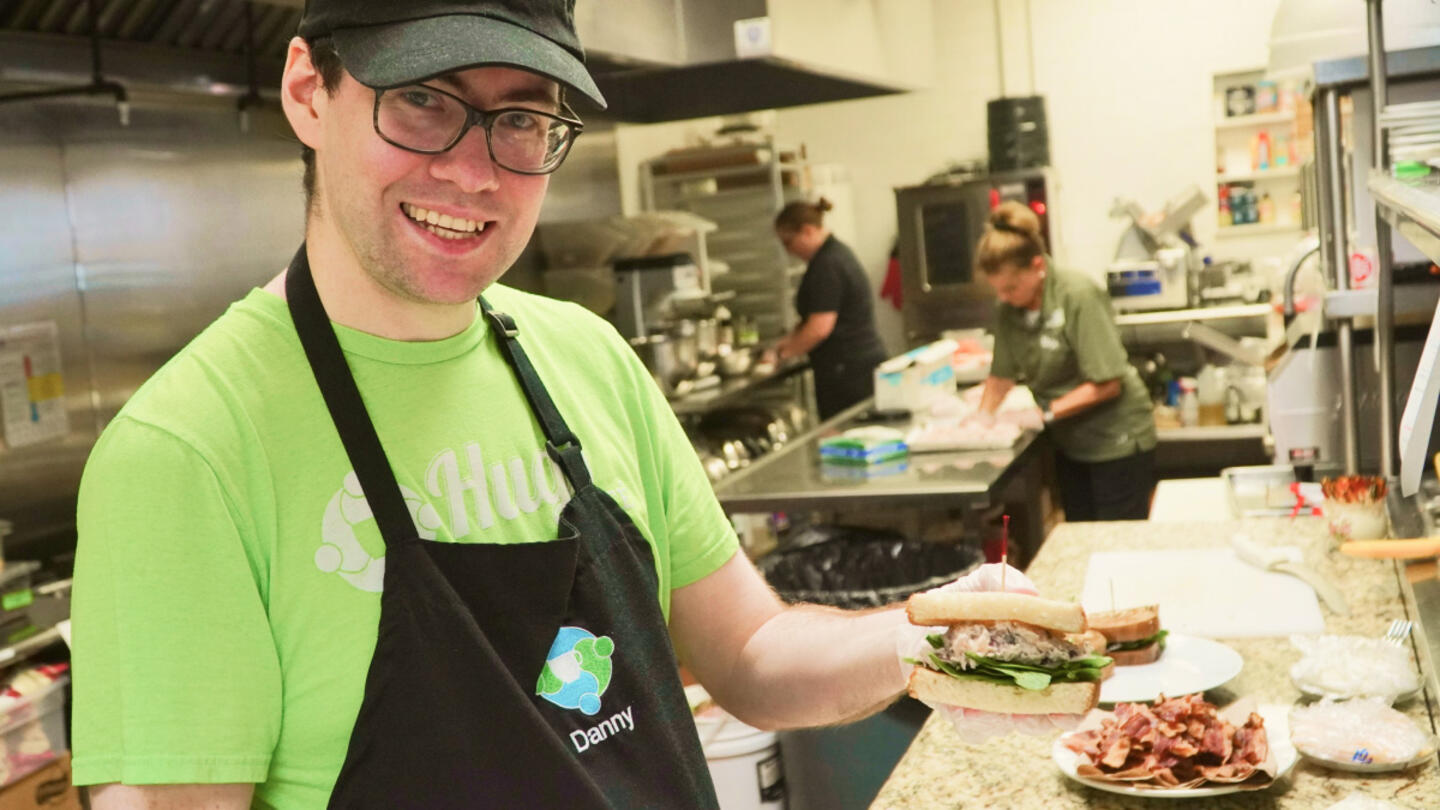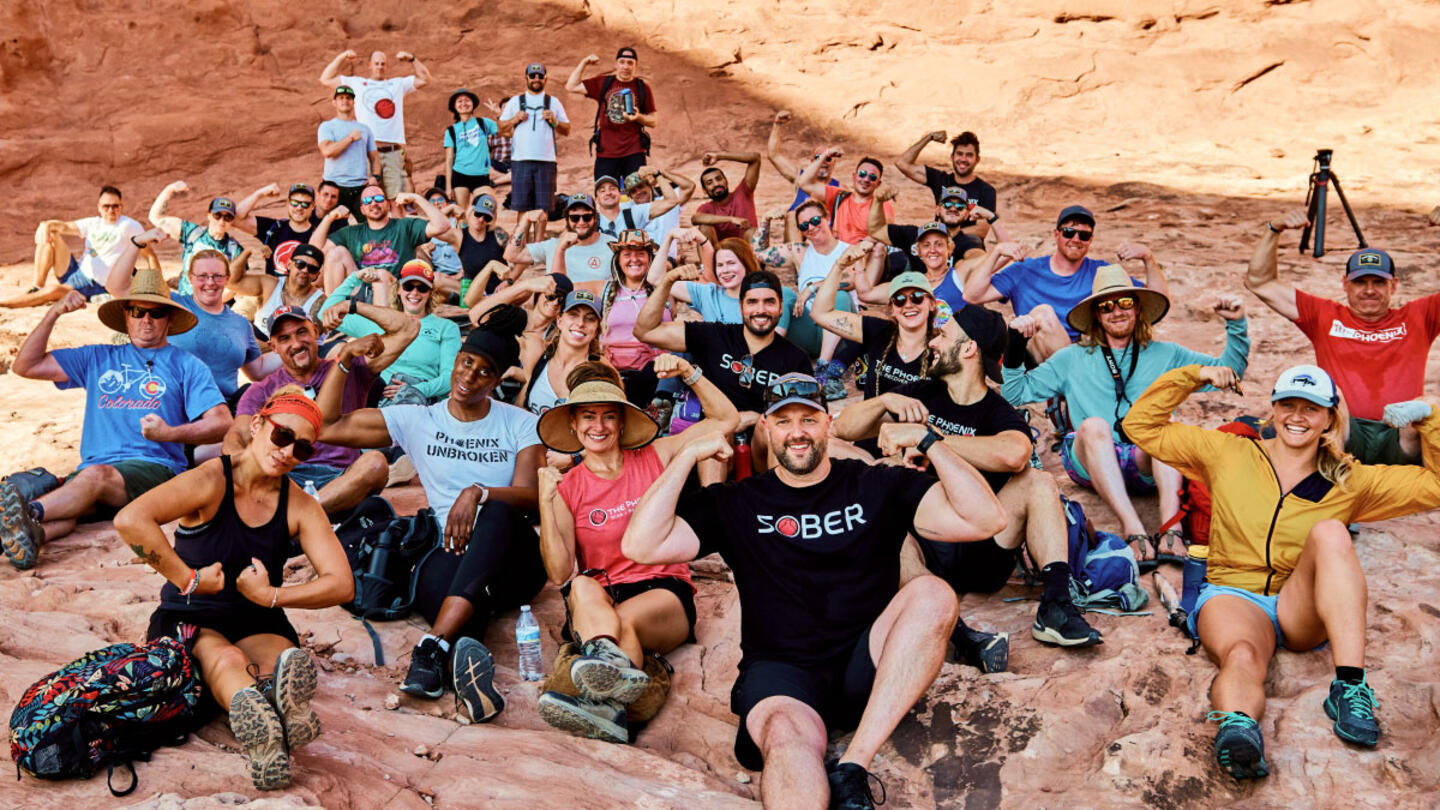As a child, Scott Strode blamed himself for, well, everything.
Growing up in an emotionally turbulent home, he believed he deserved the negativity and abuse he experienced.
At 11, when he tried beer for the first time, Strode thought he’d solved the problem. Alcohol helped him connect with people — which was all he wanted. However, just like the nearly 50 million Americans ages 12 and older who are currently battling substance use disorder, addiction crept up on Strode.
Substance use is like a treacherous friend. For Strode, it started as a way of connecting with people but ultimately deepened his isolation.
“It creeps up on you,” he said. “At first, you’re doing it because you want to feel part of a community.”
Next, there’s the party phase, he explained. It’s fun. It’s energizing. Being around people feels great, but you end up relying on the drug or alcohol to keep the vibe going. Over time, it stops working, and your dreams start to fade.
“You start to call into work,” said Strode. “You start not taking opportunities to grow on your life path because you’re too hungover or you’re at the bar when you could have been at that other, more meaningful event.”
You eventually end up surrounding yourself with people on a similar path. Like you, they’re turning to alcohol and drugs to cope with their pain.
“It becomes a place where you’re really isolated,” he said. “Even if you’re around people, you’re there to use [drugs] and not to connect with others. Ultimately, you’re alone, and you’re still doing it.”
“It’s a coping mechanism that stops serving you almost as quickly as it starts.”
So, what happens next? How does someone move from addiction and total isolation to recovery?
For Strode, the turning point was finding a community that helped him challenge the distorted beliefs that had fueled his addiction. After more than a decade of struggling, his recovery began when he joined a boxing gym, started climbing in the mountains, and surrounded himself with people who recognized his potential.
Twenty-seven years later, he’s built a community that has supported more than half a million people on their recovery journeys.
Strode details his entire journey in his upcoming book, “Rise. Recover. Thrive. How I Got Strong, Got Sober, and Built a Movement of Hope,” which is set to be released in January.
Changing your story is possible
As a child, Strode faced challenges at home due to his father’s mental health issues and his stepfather’s alcoholism.
“They had a hard time with emotional regulation, and so it often came out directed at us kids,” he said. “Those behaviors impacted me in forming my self-esteem. I felt like I was not only a problem to be managed, but I was the problem.”
His substance use initially seemed to ease Strode’s childhood trauma, but over time, it only deepened the shame and hopelessness rooted in that trauma.
“The identity piece was really hard,” he said. “For me to think of myself as anything other than the story I was living at the time of my drug and alcohol use was hard to do.”
Fortunately, other people gave him glimpses of his true self even in the middle of his addiction. One of those moments happened when he was 16.
He was attending school on a boat as part of a program for students with dyslexia. One day, the boat was hit by a severe storm. While the captain and crew were doing their best to navigate the rough weather, all the students were told to stay below deck for safety. However, when the crew needed more help, the captain called for Strode.
“I realized in that moment that I could contribute,” Strode said. “I could help the crew and everybody on the ship. The fact that, out of everyone available to help, he asked me to join the crew on deck just totally changed my perspective on how people viewed me.”
Crucially, this wasn’t just about someone giving Strode a pat on the back and saying he was a good person. The ship captain offered him a chance to make a real difference, to help others, and to take on a task no one else was asked to do. The captain’s belief in Strode and his ability to play a meaningful role in others’ safety made this moment especially impactful.
It wasn’t an instant transformation. Strode had a long road ahead in his recovery, but this moment, combined with other small yet significant experiences, gradually changed how he felt about himself.
Sign up for the Strong & Safe Communities newsletter for stories, ideas, and advice from changemakers working with their neighbors to address the biggest problems we face.
“There were little moments like that throughout my adolescence and young adulthood that began to compound and led, ultimately, to getting into recovery.”
Everybody’s in recovery from something
Strode’s healing began in his early 20s when he joined a boxing gym. “Something about getting in the ring for the first time helped chip away at my addiction,” he said in his 2016 TEDx Talk.
Then, he joined an ice climbing class. It was there, at the foot of a mountain, that he experienced relief from his emotional pain for the first time in his life.
“There’s something special that happens when you tie into a climbing rope for the first time in the winter,” he said at TEDx. “You look up at the climb ahead of you, and everything else seems to melt away. All the problems, all your worries, all the shame and self-loathing from your addiction that so many addicts feel. … In that moment, in that place, I caught a glimpse of the possibility of who I could be: courageous and confident.”
It wasn’t just the setting. The people who boxed with him — and then climbed, cycled, and ran with him — helped Strode see who he could become.
“Seeing how the guide who led us climbed versus how I did, or barely surviving a triathlon and seeing people who were crushing it,” he said, “it started to make me realize, maybe that could be me, maybe somewhere in me is that kind of strength.”
He was surrounded by people tackling tough challenges, and they were helping him do the same. He finally found the authentic connection he had been looking for through alcohol since he was 11.
“Every time I stood on top of a mountain or crossed a finish line, I was a little bit more a climber and a little less an addict.”
In his own story, Strode saw the potential for every individual struggling under the weight of personal trauma.
“Everybody is healing from something or has some anxiety or fear about being deserving and worthy of love and connection with others,” he said. “It’s bigger than just substances. People can use work, money, appearance, or social status to try and fill that void.”
Strode co-founded The Phoenix to create a space for others to experience the connection and healing that gave him his life back.
The Phoenix is a national sober active community with only one requirement: You must be 48 hours sober to participate. Phoenix members proudly wear the word “sober” across their chests. They’re reshaping the conversation around addiction and sobriety.
Starting as a single gym in Colorado, The Phoenix has expanded nationwide to serve over half a million people. Members come to help and be helped. A wide range of community-building activities create space for everyone to find their passion, from weightlifting and CrossFit to mountain biking, ice climbing, art classes, and knitting. Livestream events like sober hangouts, book clubs, and music classes are gaining momentum.
“We believe in each other, and we care about each other,” said Strode. “When we’ve found a nurturing space where we can spend time with each other and see each other accomplish hard things — whether it’s getting to the top of the climbing wall or finishing that CrossFit workout, or just standing at the top of that hill that we’re all hiking up together — we build a bond, and it’s in those bonds that we start to heal.”
“That’s when life really becomes full and meaningful.”
When did stigma ever help anyone?
“We can’t talk about healing from addiction unless we also talk about healing from trauma,” Strode said at TEDx. “I believe that trauma is the No. 1 public health crisis in our country.”
For decades, stigma and judgment have plagued those suffering from substance use disorder. What would happen in our country if we stopped viewing these individuals as “addicts” and instead saw them as people grappling with unseen trauma?
At just 11 years old, Strode was trying to soothe his internal pain caused by his father and stepfather, who were struggling with their own traumas. He made choices that nearly derailed his life forever. No amount of shame, judgment, or stigma could free him from the addiction that followed.
“Imagine you’re growing up experiencing childhood trauma,” said Strode. “Maybe you live in an unsafe community, and so you’re experiencing fear and trauma from that space. And then, because it’s often generational, you’ve lost one parent to substance use and the other to incarceration or mental health struggles. You feel pretty alone in the world.”
“If we don’t interrupt the generational transmission of that pain, it’s really likely that your kids are going to come up in the same way. Even my stepfather and father — they have their own stories that led them to their path.”
What Strode needed, and eventually found, were people who recognized his inherent worth. They didn’t see an addict. They saw a person.
This happens daily at Phoenix locations and events all over the country. Members don’t see each other as addicts. They each other for their unique gifts. They see climbers, cyclists, teammates, and friends.
Healing is what follows.
“The truth is, coming to a Phoenix event or going for a run with somebody who has a similar background to me and similar lived experience, we fist bump at the end of that run,” said Strode. “In those friendships and that connection, I find a space where I can be vulnerable and share about stuff that’s hard for me. We heal in those moments.”
In his “memoir with a mission,” Scott Strode shares his extraordinary journey from addiction to founding The Phoenix, a national sober active community that has empowered more than half a million people to thrive in sobriety.
Rise. Recover. Thrive. is a pathway to hope for millions of people — and their loved ones — who are struggling with addiction.
The Phoenix is supported by Stand Together Foundation, which partners with the nation’s most transformative nonprofits to break the cycle of poverty.
Learn more about Stand Together’s efforts to build strong and safe communities and explore ways you can partner with us.

People with disabilities want meaningful work — and Hugs Cafe is making it happen.

At this ‘resort,’ children with intellectual disabilities are seen as gifts to be celebrated and loved.

Veterans experience loss when leaving service. Could this be key to understanding their mental health?

The Grammy-nominated artist is highlighting the stories we don’t get to hear every day.
